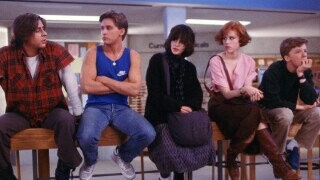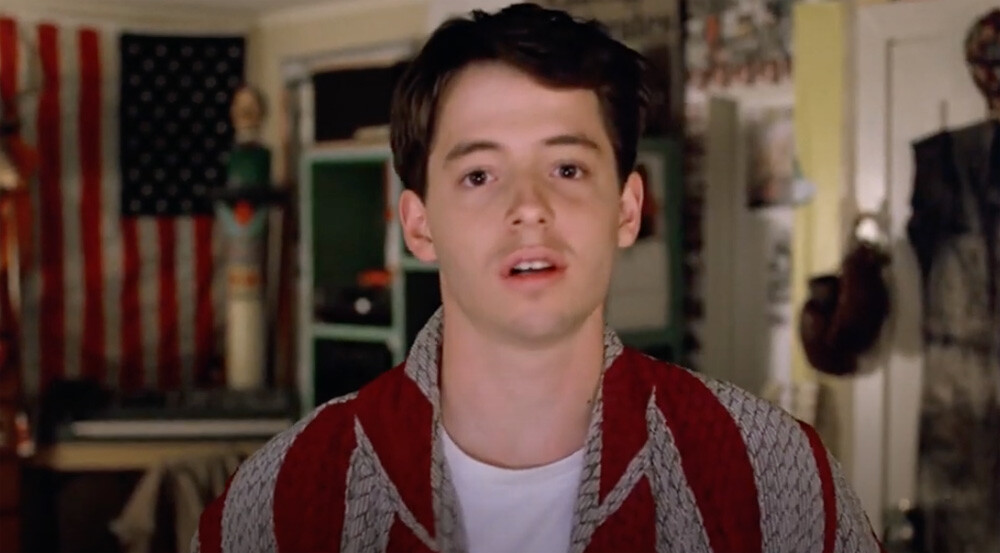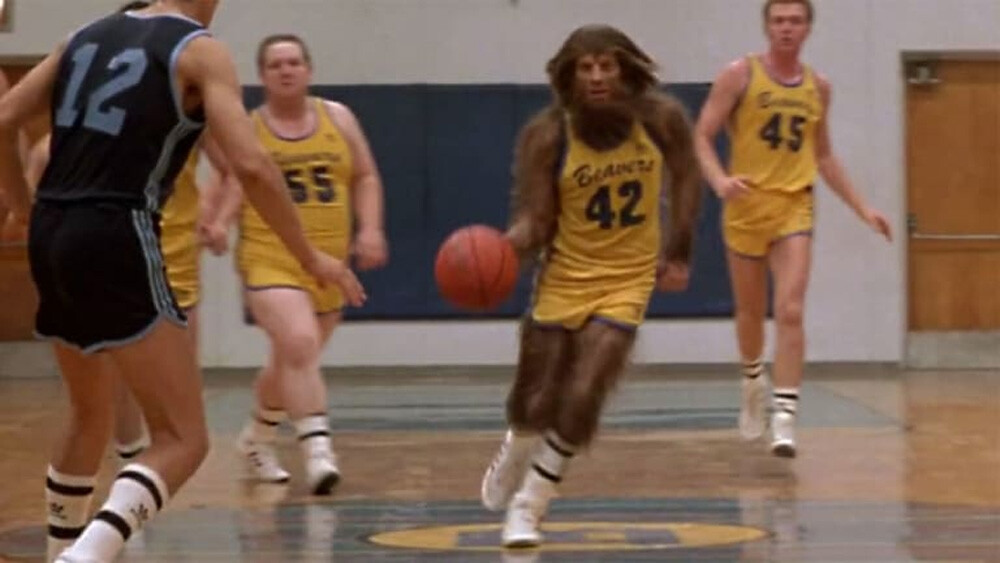4 Ways '80s Movies Broke Our Brains

The '80s was such a bizarre decade. We were just starting to see massive leaps in technology that we now take completely for granted. The economy was somehow booming and collapsing at the same time. It wasn't uncommon to hear some of the best music ever written and the crappiest songs you've ever heard on the same album.
The movies of that decade are some of our greatest time capsules, though. They reflected the attitudes of the era and influenced the culture at the same time, creating this weird chicken-and-the-egg pop culture feedback loop. While many of these movies have stood the test of time, some of them have been propped up despite having some really toxic messaging ...
My God … So Much Entitlement
It's easy to look at the viral videos of entitled people screaming at people they feel are beneath them and wonder why this behavior is suddenly so prevalent. The truth is, those people have been around forever. It's just that for years those privileged jackasses were the only ones rich enough to afford a camcorder. Back in the '80s, the only time people were caught on camera being selfish pricks was when they wrote and produced the movies themselves. Three movies in particular from that decade really went above and beyond on that front.
Don't Miss
For the Baby Boomers, there was 1983's The Big Chill. The story is about seven old friends reuniting to mourn the death of the eighth member of their circle from their college days. They spend the weekend together trying to make sense of their friend's suicide while examining how the real world has turned them all into a bunch of selfish douches. None of them really renounce what they've become, but they do spend a lot of screen time rationalizing the hell out of it. There's even a scene where Jeff Goldblum tries to rationalize the very concept of rationalizations.
Writer/director Lawrence Kasdan explained the meaning of the film's title as the "cold adult reality after leaving the 'warm embrace' of true friendship during college." He set out to write a film about so many of the self-centered traits he disliked about the Baby Boomer generation (himself included), and the film became a huge hit among Boomers because so many people saw themselves in it. It's not very often a movie tries to hold up a mirror to an entire generation only to find them falling in love with the reflection.
Just two years later, Gen X also got their own ode to the problems of seven self-absorbed white people in the form of Joel Schumacher's St. Elmo's Fire. How full of upper-class privilege is this movie? It starts with the main characters graduating from Georgetown and ends with them trying to find a new place for brunch.
Just look at this parade of red flags and keep in mind that these characters are who we're supposed to root for. There's a serial cheater, his long-suffering girlfriend, a writer who can't tell if he's depressed or just boring, an obsessed stalker, a coked-out shopaholic, a sullen prude, and a sex-crazed man-child who plays the saxophone. These people belong in a Saw movie, not a coming-of-age drama.
However, in 1986, we were introduced to the granddaddy of spoiled rotten psychopaths with Ferris Bueller's Day Off. Don't get me wrong, it is one of the most quotable and well-structured comedies ever made. Buuuuut, if you've ever had the misfortune of having to deal with a malignant narcissist in real life, this movie can take on a completely different tone.

Paramount Pictures
Ferris is a manipulative, pathological liar who is so used to scheming everyone around him that he even tries to gaslight people using pre-recorded messages. He denies hitting his best friend Cameron less than a minute after hitting him three goddamn times. He even breaks the fourth wall to try to convince the audience why he deserves to get whatever he wants and whine about everyone standing in his way. Slow your roll there, Holden Caulfield. The only time you never got your way was when your parents bought you a $10,000 keyboard instead of a car.
That's why the fan theory saying that the events of the movie only take place in Cameron's head makes so much more sense. Only someone as neglected and unloved by his parents as Cameron would conjure up someone as toxic as Ferris as a coping mechanism.
They Gave Horrible Advice On Political Activism
As a million editorials and poorly researched think pieces have pointed out, American politics has been a power struggle between the Baby Boomers and the Millennials, leaving Gen X completely out of the debate. It's okay; we're used to it by now. Nearly everything that we Gen Xers have ever enjoyed was at one time blamed for the destruction of American values, so it's not surprising no one cares about our votes.
But all of those think pieces are mostly wrong. The truth is many of America's most high-profile political figures and commentators today are Gen X, or at least fall one or two years shy of it. The problem is most of them are … just horrible people. And even though they are technically a part of this generation, it's pretty clear they weren't there for it. Marco Rubio is three weeks older than Tupac Shakur for crying out loud. Ted Cruz is four days younger than DMX. Tucker Carlson is the same age as Dave Grohl.

InfoWars
Every generation's politics has been reflected in its pop culture. Baby Boomers, having been the key sales demographic for decades, had hit films that catered to every stage of their ideological evolution, for better or worse. It's so weird to think that Easy Rider, Wall Street, and Grumpy Old Men were all marketed to the same group of people.
Skip a generation to the Millennials and Zoomers, who grew up far more connected to the world as a whole in a time when that world made far less sense than ever. They grew up on a diet of stories like the Harry Potter and Hunger Games franchises, stories of young people banding together to take on a power structure built on past generations' prejudices. Those movies taught them that the future is worth fighting for, and that's part of why their generation is now considered such a strong threat to the status quo.
But back to Gen X, who pretty much got shafted on good advice for how to handle any of our problems. Got a bully? Maybe your building's handyman will teach you karate. Perhaps you could use your home computer to materialize a supermodel with god-like powers. How about going on a murder spree with Christian Slater? Wait … can you turn into a werewolf?

Wolfkill Productions
Say you have a greedy, well-connected land developer trying to force you out of your home. You could hire a good lawyer, get the media on your side, and fight them in court, or … Have you tried breakdancing your way out of it? What if you challenge the guy's son to a downhill ski race? Maybe there's a treasure map in the attic. That'll solve everything!
There were really only two '80s movies that attempted to show Gen X the importance of working together to take on a corrupt system. The first was 1984's Red Dawn, a jingoistic right-wing masturbatory aid about a ragtag group of Colorado teenagers banding together to defeat (checks notes) the entire Soviet army. The other was 1985's The Legend of Billie Jean, the story of a young woman who transforms herself into a heroic crusader for justice because … some guy refused to pay for her brother's scooter. Between those two extremes, it's really no wonder that Gen Xers generally don't find a lot of hills worth dying on.
High School Clique Movies Made Cliques Way Worse
Writer/director John Hughes had one hell of a career in the '80s. Mr. Mom, Vacation, Sixteen Candles, The Breakfast Club, Weird Science, Ferris Bueller's Day Off, Some Kind of Wonderful, Planes, Trains & Automobiles, The Great Outdoors, Uncle Buck … the guy just cranked out hit after hit. He was a brilliant writer who could craft a story with amazing dialogue out of practically nothing.
Hughes also had a massive hard-on for the social hierarchy, almost like he wrote all of his scripts with a label maker. Every character had their social status branded on their foreheads, and no one stepped outside of their little bubble without all hell breaking loose.

Universal Pictures
"Uh, I never even thought of myself as a stereotype, but I will now."
Where John Hughes really shined was with his high school comedies. He really was one of the first filmmakers to recognize that teenagers were capable of articulating complex emotions. Even if the character carried the brand of a criminal, jock, princess, basket case, geek, sporto, motorhead, slut, blood, wastoid, dickhead, or neo-maxi zoom dweebie … Hughes was really good at humanizing them.
Maybe he humanized them a bit too much because people really latched on to those characters, sometimes even adopting them as their entire personality. You definitely didn't need a BuzzFeed quiz to tell you which character from The Breakfast Club you were in high school. If you were ever in doubt, believe me, your classmates had already made that decision for you.
Unfortunately, John Hughes' teen comedies inspired a host of other high school movies over the following decades that had the same ideas about social hierarchy, but with the added twist that in order for someone to break free from their label, something or someone needed to be destroyed. Heathers, Pump Up The Volume, Dazed and Confused, Varsity Blues, Rushmore, Election, Mean Girls, etc.; what the hell happened? These movies evolved from ending with an argument at prom to nuclear revenge pretty damn quickly.

New World Pictures
Oh, we'll talk about getting laid in a sec, don't worry.
But perhaps the greatest influence these high school movies had is what we see every day on social media. Everyone is locked into their own little social groups, and if anyone steps out of line, it's not enough to just destroy them. You also have to shame any friends you might have in common. It's really no surprise that every time some jackass lands themselves in Facebook jail, they almost always return with a lengthy F-you post that reads like the essay The Breakfast Club was forced to write in detention.
They Made Losing Your Virginity Way Weirder Than It Needed To Be
Prior to 1980, losing one's virginity was a topic mainstream Hollywood productions were not yet ready to embrace. If a film touched the subject at all, it was handled rather clumsily, the film's climax left a lot to be desired, and everyone involved was too embarrassed to talk about it after its release. But once the '80s began, Hollywood suddenly got the urge to stick that plot point in anything they possibly could, and soon came a huge explosion—all right, I just had to get most of the puns out of my system. Moving on.

20th Century Studios
Once Hollywood started utilizing losing the V-card as the MacGuffin in so many films, it did not take long for things to get weird. As much as we hate to give the film credit for being groundbreaking in any way, 1981's Porky's really set the standard for the wave of teenage sex comedies that followed it. It focused on a group of teenage boys who were all desperate to lose their virginity, which leads them on a series of wacky adventures to commit a series of horrific sex crimes. But since the film was set in the 1950s, these actions were brushed aside as boys being boys, but because society still hadn't really evolved since then, the film wound up getting two sequels and a 2009 reboot.
But Porky's box office success ended up spawning an entire genre of films where characters treated their virginity like it was a bomb strapped to their crotch, and they needed someone, anyone, to take it away. Yes, it did sometimes feel that way being a hormone-filled teenage virgin in real life, but these movies gave the absolute worst advice on what to do about it.
For example, you probably shouldn't set a specific deadline for your first time (Losin' It, My Tutor). The closer you get to that deadline, the more desperate you're gonna get. Likewise, don't make it into a contest (Little Darlings, Sixteen Candles) because then you're only gonna start out desperate, and we all know how much of a turn-on that can be.

Paramount Pictures
Other horrible advice for first-timers from 80s teen sex comedies: Enlisting the help of the cool kid (Goin' All The Way, Fast Times At Ridgemont High), caving to peer pressure (The Beach Girls), hiring a shady prostitute (Risky Business), hiring a friendly prostitute (Biloxi Blues), going for your best friend's mom (Class, Homework), sexually assaulting the head cheerleader by pretending to be her boyfriend (Revenge of the Nerds), taking guidance from the ghost of a dead porn star (Meatballs III), selling your soul (The Party Animal), or participating in an orgy just because you're stuck in a cave together after one guy's fart triggered a landslide (The First Turn-On!).
I'm being incredibly glib here. I know that these films were never intended to be taken seriously. Most of them were just shameless excuses to get away with showing as much gratuitous T&A as an R rating would allow. Maybe even a couple of them were just a test to see if an erection could write a screenplay. The problem is, they can't market a movie about horny teenagers behaving badly directly to horny teenagers, and not expect some of those bad ideas to rub off on them (last sex pun, I swear).
Besides, someone having sex for the first time and everything that leads up to it is not meant to be the plot of a movie. Everyone's first time falls somewhere between embarrassingly awkward and cripplingly traumatic. You know what might make an interesting movie? The second time someone does it. The redemption arc of a bruised ego. A rematch that's all about pride. It'd be like Rocky II, only they can't quite figure out if they're Rocky Balboa or Apollo Creed.

Universal Pictures
But if you're sitting there thinking, "Whatever, man, my first time went perfectly. I was amazing!" Really? Go ask your partner how well you did that night. Better yet, step out of the room and have their best friend ask them what really happened. Something tells me these stories aren't gonna line up the way you think.
Top image: Universal Pictures
